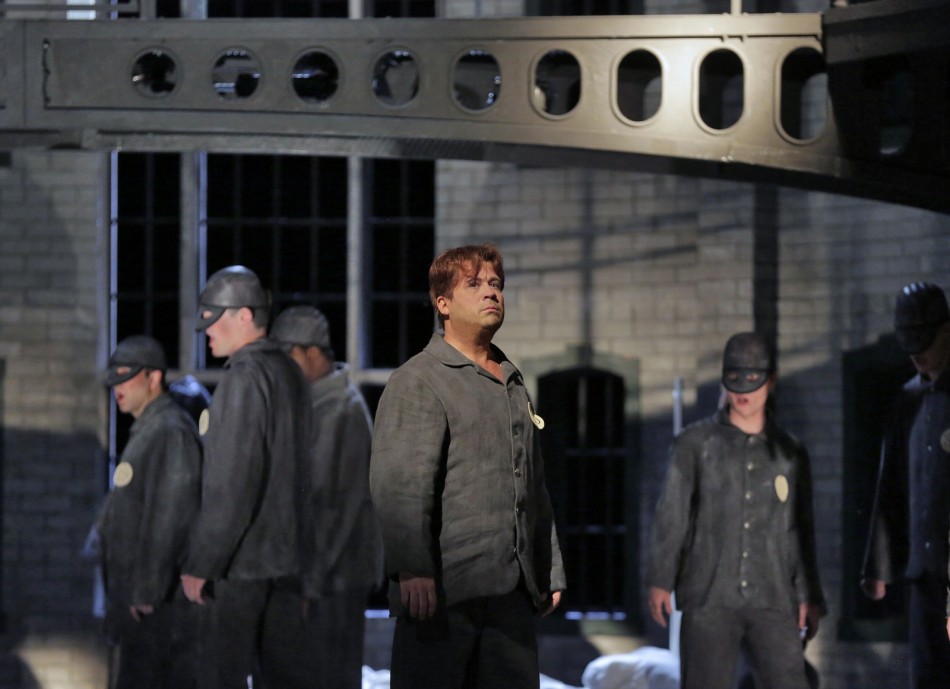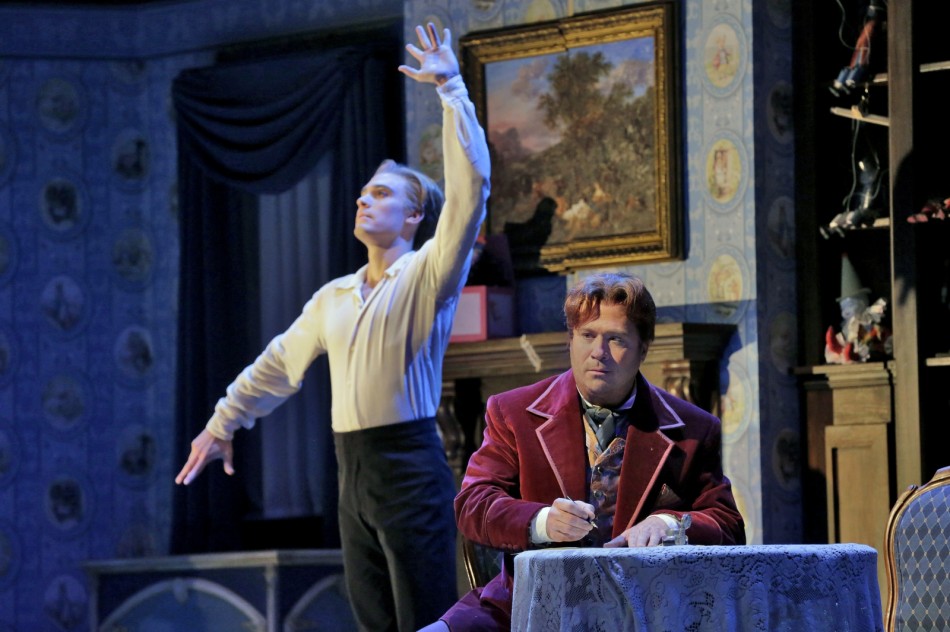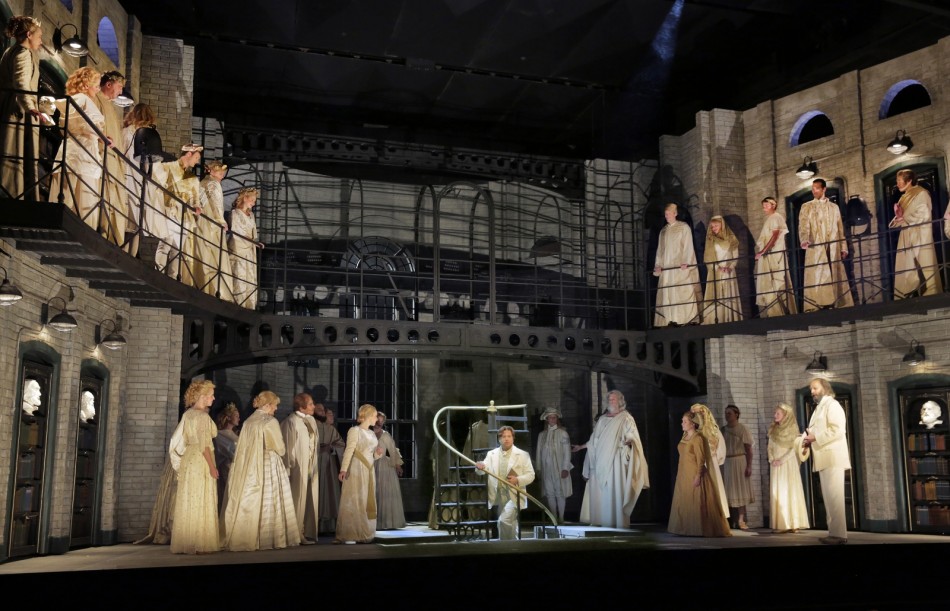
Oscar Wilde's two-years hard labor at Reading Gaol occupies the opera
Santa Fe Opera Neuters Oscar Wilde
Little of Oscar Wilde’s wit or queer hunger is evident in Oscar, which world-premiered at the Santa Fe Opera on July 27th. Wilde would recognize his signature burgundy coat, and hear something of his own mezzo in countertenor David Daniels – who wears red hair, but lacks Wilde’s flouncy elegance. He would recognize the grim libretto remembering his two years’ hard labor at Reading Gaol, after being convicted of sodomy (“gross indecency” in 1895). Beyond that, he might wonder why the opera need be quite such a prudish apologia, so intent on its own goodness.
Wilde’s writing and a few bon mots provide half the opera’s lyrics, making him the third librettist beside Theodore Morrison (who also composed the opera), and John Cox. But Oscar’s transgressive energies (“people who love only once in their lives are the shallow people”) are voiced mostly as obscenities and crimes by his enemies. The opera attempts “a treatise on human rights,” in the words of director Kevin Newbury. Oscar tries to hitch the sagacious mind behind Lady Windermere’s Fan to the gay democracies of Walt Whitman (baritone Dwayne Croft). It’s a canard.
From the outset, Whitman’s appearance in a pristine white suit, emerging from a contrived white-busted pantheon of immortals, is bewildering. Croft is right for the Whitman of elegies and sorrows, but there is no unbuttoned shirt, “passing stranger” lean. Accompanied by composer Morrison’s appealing Americana – sweeping Copland with a side of Bernstein – Whitman provides a kind of choric narrative, although why he’s here at all is mystifying. Perhaps it’s the opera’s awkward hope that Whitman’s Song of Myself ethos will play as expansive American innocence to Wilde’s ungoverned appetites.
The music’s theatrical reach, despite Morrison’s abundant lyrical empathy, can invoke camp effects – the street nerves of a West Side Story. Act 1, with bombastic brass and generic, galloping rhythms, follows Wilde’s desperation as he tries to secure his usual hotel rooms. He’s consumed with his young lover, Lord Alfred “Bosie” Douglas whose father, the Marquess of Queensbury, ruthlessly stalked Wilde unto trial.
Turned away, cursed as a “Nancy,” Wilde finds refuge with his close friend, author Ada Leverson (the sometimes over-glorious but witty soprano Heidi Stober). They gather in her daughter’s nursery — a happy Victorian suite of teddy bears and harlequins, where the violin’s lovelier domesticities lighten the musical jitters.
But the nursery perversely turns into the Old Bailey courthouse. Cherished toys re-form as grotesque juror puppets; their paper hearts mock justice. Judge Mills as a three-foot-tall Jack in the box, sways on woozy springs. The crib becomes Wilde’s witness box and eventually, prison cell. Morrison’s choral work, like an eruptive, polyphonic mob, is a marvel of misrule, conjuring opera’s essential, self-aggrandizing gaiety. “Outrageous!” protests Oscar’s friend Frank Harris (spirited lyric tenor William Bureden). Spectators taunt, “Jus-tice!” The climactic verdict is sung to “God Save the Queen.”
As this circus segues in Act 2 to Reading Gaol, the site of Wilde’s brutal imprisonment, the co-librettists turn to the Ballade of Reading Gaol, Wilde’s long poem written from prison. Its rhymed and rhythmic paces ritualize, as does the opera’s deliberately claustrophobic choreography, the trudge and numbing go-round in the prison yard, the 10,000 slow turns of the crank that constituted some of Wilde’s harshest labor.
Whitman re-enters to sing a brooding death vigil with Oscar and the inmates as they watch a graphic hanging (“the man had killed the thing he loved/And so the man must die”) presided over by prison governor, Henry Isaacson – sadism personified in bass Kevin Burdette.

Bosie as Oscar’s daemon in dance sequence choreographed by Sean Curran
Daniels tries to give some force to Wilde’s self-recriminations and torment in prison, but there simply isn’t enough hard honesty coming from the libretto. For that the opera should have relied more on the moral complexity in de Profundis, the 50,000-word love letter to Bosie that Wilde also wrote from Reading. That work is, in Oscar, muted, distorted, mostly neutered – a pity, since it combines theatrical brilliance with existential reckoning.
What the opera does right is the character of Bosie (Reed Luplau). As Wilde’s obsessive dream and the opera’s magic shadow, he gestures exquisitely as the link between art and sexual selection. Sean Curran, subtly using the body language of arousal, choreographed Bosie to suggest both Wilde’s seductive flower and his destructive metamorphic daemon. It was actually Oscar Wilde who “created,” in de Profundis, this Bosie for posterity (Wilde averred, “I must write your life for you” ); making it troubling and misleading that the librettists drew from the Profundis of ardent confession and sorrow’s holy ground rather than Wilde’s searing bitch prose detailing Bosie’s shallowness, guile and betrayals.
Daniels’s counter-tenor is avian, a songbird on the wing of the much-sung “beautiful,” but also extremely muscular when crying out for his “Bosie!” But because the countertenor’s falsetto ranges so high above the natural speaking voice it misses the promise of Oscar as the “best talker in the world.”
In a wincing finale made more preposterous by its supernatural audacity, Whitman welcomes Oscar, now also clad in white, into immortality. For character intrigue and tragic arc, Oscar wanted not a redemptive afterlife but something of his days before Reading as an Oxford savant, literary celebrity, London’s epigrammatic butterfly enjoying opium-tipped cigarettes and rent boys.
Such reach for moral, “immortal” high ground, betrays, finally the opera’s own anxiety about the real Oscar’s embodied wildness.
Photographs: ©Ken Howard, courtesy Santa Fe Opera.

Oscar Wilde wrote, “I don’t want to go to heaven. None of my friends are there.”
